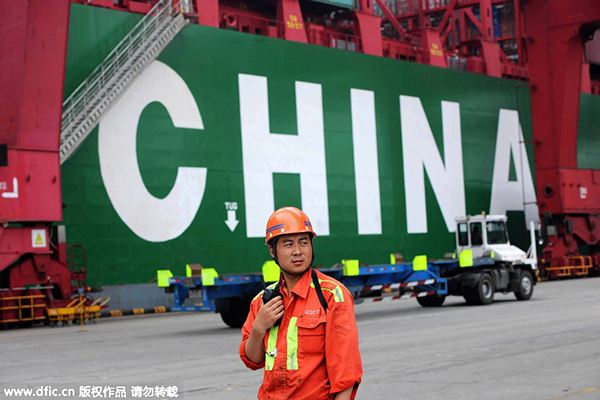 |
|
A stevedore works at Qingdao port in Shandong province, July 1, 2015. [Photo/IC] |
Axel van Trotsenburg, vice-president of development finance with the World Bank, shared his views with China Daily on China's changing role as a global development partner because of its growing stature in an evolving multilateral landscape. In an exclusive interview, he talks about China's increasingly important role on the global stage and its strengthening relations with established multilateral banks through the formation of institutions such as the Asian Infrastructure Investment Bank.
The IDA, or International Development Association, is a fund of the World Bank that provides grants and credits at concessional rates to the poorest countries for projects aimed at alleviating poverty and boosting growth.
Q: How has China's role changed in recent years as an IDA partner?
A: China has been playing an active role since the establishment of IDA in the 1960s. It is playing a more significant part in the international community after switching its role as a beneficiary country receiving aid funds to a donor country in 2007. China is now giving back more to the international community. As the world's second-largest economy, China is not only providing financial support to development, but also contributing to it by sharing its experience on poverty reduction and offering new ideas for the negotiation process of $52 billion of IDA replenishment, where half goes to African countries and 42 percent to Asian countries. China has shown solidarity for and cares about jobs and economic development in recipient countries.
Q: China is now playing a significant role as the leading founder of the AIIB. How do you evaluate the role change and the AIIB's future collaboration with the World Bank?
A: The World Bank has a close relationship with the AIIB starting from its establishment, and we share a lot of things in common, especially in providing support to infrastructure projects in developing countries, though the AIIB does have a more specific focus. There is a lot of space for collaboration between the World Bank and the AIIB in the future, and we welcome the AIIB to make more contribution.
I would say we are not at all competing with each other. The funding gap is so huge that probably even all the multilateral banks put together cannot fill it. The World Bank's capital base is about $223 billion, the Asian Development Bank's is about $160 billion, and the $50 billion initial capital of the AIIB is far from enough to fill the gap. The challenge is huge-so rather than engaging in a narrow competition, it is better to try and fill the gap and serve the countries better. We are actually competing to get better results.
Q: Can future collaboration fill the sizeable gap?
A: The gap is widening by $1.5 trillion per year, which will be harder to fill if all the multilateral banks engage in narrow competitions. While specific projects have yet to be announced, we expect to do quite a bit in co-financing with the AIIB to better meet the demands articulated by the governments in Asian countries, as the gap is being identified on a country-by-country basis. We also hope to invite more private sector players to co-finance the projects, because the public sector is finding it difficult to complete the projects on its own.